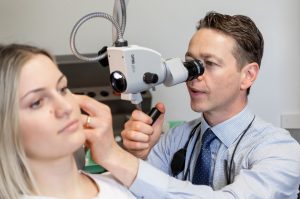Speaking to Central Adelaide clinicians at a recent forum, Professor John Spertus outlined some of the evidence supporting the benefits of using capturing patient reported outcomes which can help clinicians in many ways.
Focussing on what matters most to patients
Clinicians are often focused on ensuring the disease doesn’t get worse for their patients. However, Professor Spertus claims, that it is goals relating to ‘health status’, such as symptoms, quality of life and how well they function in daily life, that is often what patients care most about.
“Those ways in which the disease manifests itself to patients is what we call their health status,” he said.
“It turns out that is this is even more important to patients than the clinical aspects that have dominated the outcomes of our clinical trials.”
“We just need to listen”
Using validated and structured methods of capturing patient reported outcomes, as opposed to unstructured interviews, clinicians can improve the accuracy of the information they collect from patients. This can drastically impact the care they provide and the outcomes for patients.
“If we’re seeing somebody bright and early on a Monday morning, when we haven’t been on call, versus late in the day on Thursday when we’ve been up all night, we’re not going to ask it the same way or document it the same way.”
In explaining the impact, Professor Spertus reported on his research observing superior recognition of angina using a validated patient questionnaire, compared to physicians’ own assessment.
This difference can have a dramatic impact on a patient. With better recognition of angina, physicians were 90 per cent less likely to introduce a new diagnostic or therapeutic intervention.
“This, to me, is a very strong case for a more objective way of collecting health status, than we currently use in clinical practice.”
In addition to defining the status of a medical condition, Professor Spertus has demonstrated further benefits of incorporating patient reported measures in healthcare, such as:
- identifying patients who benefit from treatment and help them choose a treatment based on what matters to them,
- monitor responses to treatment,
- support population health management, and
- define the quality of healthcare.
“I think hearing the patient’s voice and getting that integrated into the way we deliver healthcare is absolutely critical. We just need to listen.”
John Spertus is Professor of Medicine, University of Missouri-Kansas City and Adjunct Professor, University of Adelaide. He has been a pioneer in improving the patient-centeredness and value of healthcare with a focus on the use of patient-reported outcomes as outcomes in clinical trials, as tools in clinical care, and as measures of healthcare quality.



